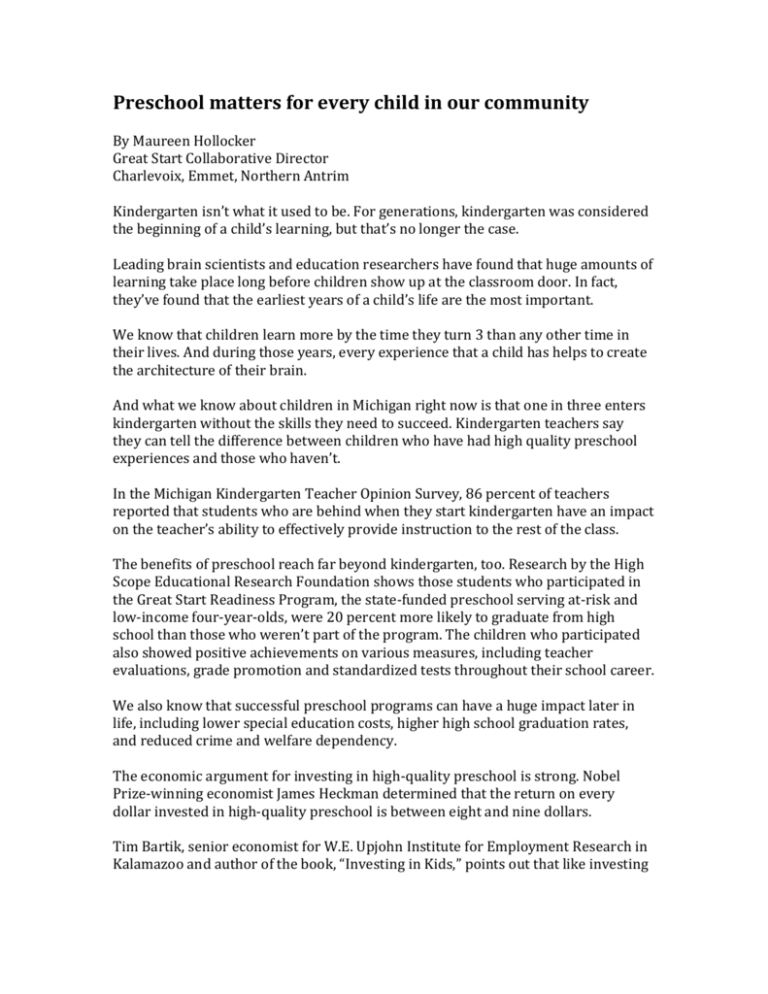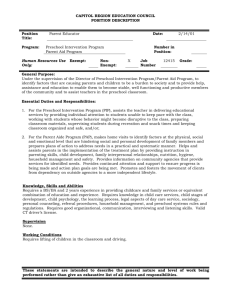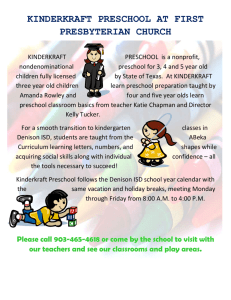Preschool matters
advertisement

Preschool matters for every child in our community By Maureen Hollocker Great Start Collaborative Director Charlevoix, Emmet, Northern Antrim Kindergarten isn’t what it used to be. For generations, kindergarten was considered the beginning of a child’s learning, but that’s no longer the case. Leading brain scientists and education researchers have found that huge amounts of learning take place long before children show up at the classroom door. In fact, they’ve found that the earliest years of a child’s life are the most important. We know that children learn more by the time they turn 3 than any other time in their lives. And during those years, every experience that a child has helps to create the architecture of their brain. And what we know about children in Michigan right now is that one in three enters kindergarten without the skills they need to succeed. Kindergarten teachers say they can tell the difference between children who have had high quality preschool experiences and those who haven’t. In the Michigan Kindergarten Teacher Opinion Survey, 86 percent of teachers reported that students who are behind when they start kindergarten have an impact on the teacher’s ability to effectively provide instruction to the rest of the class. The benefits of preschool reach far beyond kindergarten, too. Research by the High Scope Educational Research Foundation shows those students who participated in the Great Start Readiness Program, the state-funded preschool serving at-risk and low-income four-year-olds, were 20 percent more likely to graduate from high school than those who weren’t part of the program. The children who participated also showed positive achievements on various measures, including teacher evaluations, grade promotion and standardized tests throughout their school career. We also know that successful preschool programs can have a huge impact later in life, including lower special education costs, higher high school graduation rates, and reduced crime and welfare dependency. The economic argument for investing in high-quality preschool is strong. Nobel Prize-winning economist James Heckman determined that the return on every dollar invested in high-quality preschool is between eight and nine dollars. Tim Bartik, senior economist for W.E. Upjohn Institute for Employment Research in Kalamazoo and author of the book, “Investing in Kids,” points out that like investing in economic programs aimed at job creating, investing in high-quality preschool programs can also lead to creating more and better jobs. Bartik says it does this by improving the skill levels of the local workforce, which results in increased earnings for state residents. In fact, Bartik points out that for every $1 invested in high-quality preschool, state earnings increase by $2.78. Sometimes people argue that it doesn’t make sense to invest in preschool if children are going to benefit from it and then just move someplace else. But Bartik points out that studies show more than 60 percent of Americans spend most of their working careers in the state in which they were born. Research and studies point to why preschool is important, but for most of us it just boils down to common sense. The earliest years of a child’s life, when the brain is like a sponge soaking up information and experiences, are fundamentally important to their development. We need to give each child the opportunity for success in school and life, and it begins with high-quality preschool.






